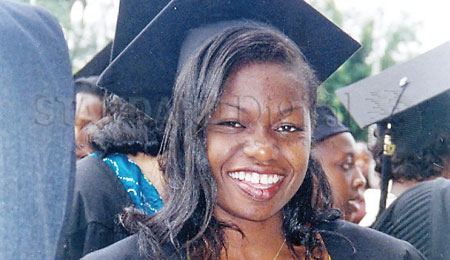 |
| Uduak Amimo when she graduated with her first degree |
She is so confident and on point while on TV, she may come off as arrogant and domineering, but far from it. UDUAK AMIMO is so warm one would want to have a chat with her over some good coffee, as DAVID ODONGO finds out
On cold Tuesday morning, I head to Yaya Centre to meet one of Kenya’s famous TV personalities, Uduak Amimo. She had sent me a text to confirm the meeting, slated for eight in the morning at one of the cosy restaurants. Immediately I settle down, Uduak sends another text — she wants us to meet at a different coffee house, so that she can have breakfast. I head there. I scan around the restaurant and my eyes settle on her. She is glued on her blackberry. I gently tap her on the shoulders and I’m received with a friendly smile. “Are you David? Please have a seat, I am just having my breakfast,” she says warmly. “Please join me.”